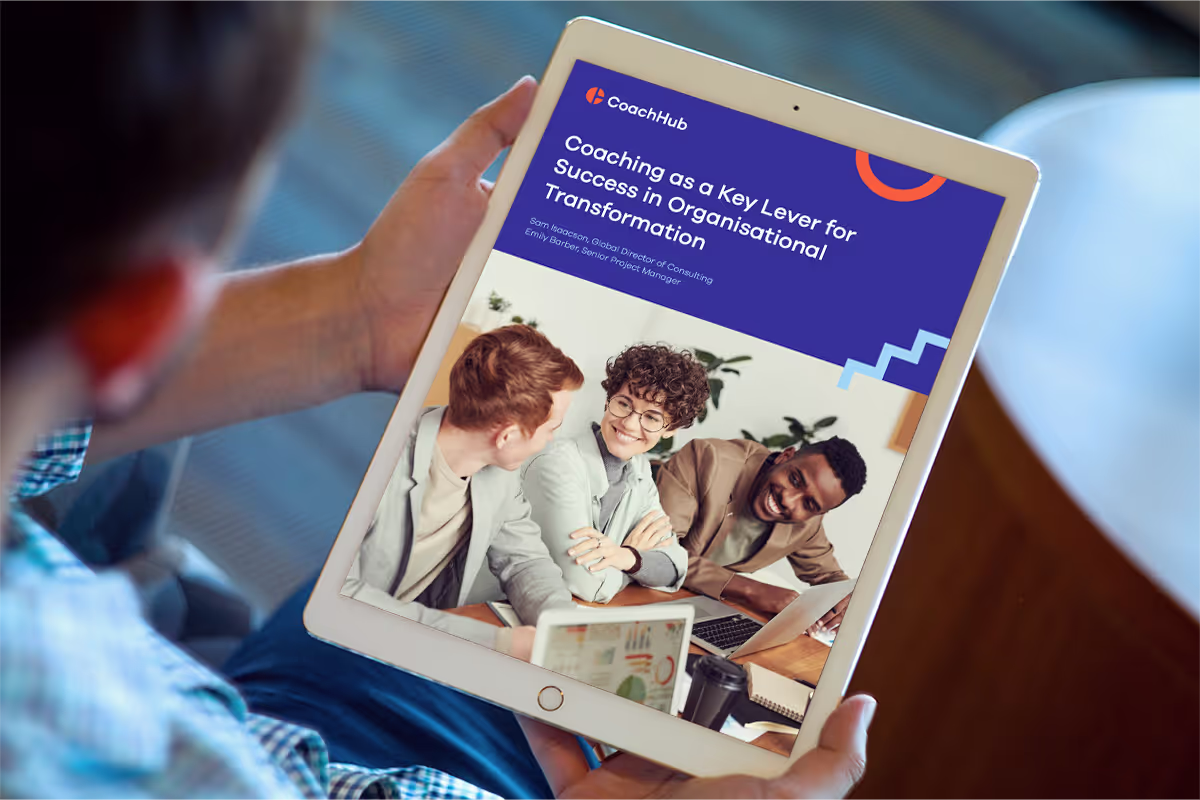Common HR Challenges in Organizational Change Management

Gone are the days when corporate HR departments focused primarily on bringing new people into the company. Today’s HR professionals are strategic business partners deeply involved in facilitating complex organizational change. They must be as well-versed in navigating incremental changes to the business as they are in coaching people through abrupt and/or transformational shifts.Change agility is just as important personally as it is organizationally. HR leaders with working knowledge of organizational change management strategies are uniquely qualified to help companies overcome the challenges they’ll face as they move toward a new way of doing things.
What is organizational change management?
Before we get into change-related challenges, let’s take a look at what comprises organizational change management. It is a discipline that can be used to guide companies through any type of change, from acquisitions, downsizing and divestments to technology implementations, market redirects and wholesale shifts in business strategy. There are several change management methodologies, two of which (Lewin and Kotter) we explored in a previous post. For HR professionals, having a deep understanding of business goals, the psychology and mechanics of change management—the models share much in common—and solid project management skills give their company a leg up. Why? Because in business, the only constant is change. Companies that embrace change and have the know-how and agility to address it effectively win.Organizational change management generally involves strategies for addressing change before it happens, while it’s being instituted and after implementation.
Preparing for the change
In many models, this is where a lot of the heavy lifting takes place. HR leaders may be involved in shaping the narrative (what needs to change and why), understanding who in the business will be affected and how, identifying champions and detractors, and assessing projected outcomes. They will use their understanding of the organization and its teams to help shape change management plans, identify milestones and put together incentives that help people stay on track. They will evaluate whether the company has the skills, knowledge and tools to implement the change and live in the “to-be” state effectively. They will surface potential roadblocks and devise ways around them.
Implementing the change
Whether incremental or transformational, change is disruptive to some extent for all involved. To minimize disruption, HR works with company leaders, change ambassadors, managers and employees at all levels of the company to ensure they have the information, tools and training they need to implement the change successfully. Ferreting out disinformation and addressing dissenters’ concerns are important to implementing organizational change successfully as well. It’s human nature to be unsure of the unknown.
Enculturating the change
To ensure the change sticks, HR leaders continue to provide the information, tools and training people need to perform their jobs successfully in the new environment. This “care and feeding” stage keeps people from reverting to what was comfortable but no longer serves the business well. HR professionals also serve as counselors to the ambassadors and the leadership team, coaching them on how to ensure long-term success. They may also be involved in coaching employees on how to embrace the new way of doing things. Effective change management requires post-implementation discipline.
Overcoming the Challenges of Organizational Change
Complex change management initiatives come with complex challenges. Even relatively simple, incremental changes to business processes or organizational structure come with issues that should be addressed to make the shift as effortless and effective as possible. Here are a handful of challenges that our transformation coaches see quite often and what they recommend managers can do to help people overcome them.
Challenge #1: Not believing change is necessary
Unless the issue at hand is undeniable and everybody knows about it—a rare occurrence in large, complex organizations—framing the problem and educating teams on what needs to change and why is going to be imperative. An airtight communication strategy is key. Even if the issue well-known it may not be well-understood, and there may not be consensus on what the company should do about it. This can be especially tricky when the business is doing well at the moment. Define the issue clearly, lay out the case for change and talk candidly about the consequences of not taking action. Projected outcomes can be powerful, especially when they’re not positive. Make the status quo seem more perilous than embarking on the unfamiliar. The sense of urgency should be palpable.
Challenge #2: Hostility toward the change
Even if people understand the issue, they may not agree that there’s a problem. And if they agree that there’s a problem, they may not be on board with the proposed solution. Be aware of the politics and conversations going on behind the scenes. Pocket vetoes are a real risk, as are unhappy employees with a broad network. So are people who are tasked with keeping the business running, such as the IT leader whose motto is “don’t break it.” Find the detractors early, understand their reticence and help them move toward acceptance. At some point, HR leaders need to be prepared to let go those who cannot make the adjustment needed to drive the business forward. Allowing cynicism to fester can collapse the entire initiative.
Challenge #3: Fear of change
People fear change for a number of reasons, so step #1 for HR and change management leaders is to understand why the fear exists. Are people afraid they won’t have the knowledge or skills to be successful in the “to be” state? That they’ll lose their jobs? That they’ll find themselves in a diminished role or one they don’t like? Once the fear is understood, skilled HR leaders can and should coach managers to deal with those fears effectively. Also consider implementing transformational change coaching for employees company-wide to help teams succeed in the face of disruption and volatility.
Challenge #4: No clue how to make this work
This falls squarely into HR’s lap. In order to make the desired change, people not only have to be aware of the problem and want to change, they also have to have the knowledge, skills and tools to do so. Do not let people drift. HR leaders need to do their due diligence well before implementation and put a communications/training plan in motion. People who don’t know how to do what’s being asked of them or who don’t have the tools/tech in place to do it can become detractors quickly or simply keep doing what they’ve been doing all along.
Challenge #5: Reverting to the familiar
If people find the new way of doing things is too difficult, time-consuming or unwieldy, they’ll go back to doing what they know how to do. That may be a nice short-term fix in their eyes—they’re getting the job done efficiently by working around roadblocks—but it will render the implementation irrelevant. Reward programs that incentivize desired behaviors are key, as is behavioral modeling by those in positions of influence. Likewise, there must be clear consequences for repeat offenders. Credible communication (and a lot of it) about the benefits of the change, success stories, and how hiccups are being addressed are all important. Don’t be passive about it. Don’t just hope for wins, successes and solutions; build opportunities for them into the change plan.
Challenge #6: Post-implementation layoffs
Companies really struggle with this one, especially when they need people with specific skills to get the implementation done, but they don’t need them once it’s finished. Acquisitions are notorious for this. It’s definitely a fine line. First, accept the fact that people probably know more about their fate than you think. Don’t hide behind corporate HR-speak such as right-sizing, reduction in force, etc. Be scrupulous about dealing with employees fairly, thanking them sincerely for their time with the company and providing meaningful pre- and post-layoff assistance. People have bills to pay and few will be in a position to absorb being jobless for long. A guiding principle: People are people first, not employees. Behave accordingly.
Coaching as part of the organizational change management strategy
The challenges associated with organizational change management cannot be understated. Managing the people side of the business well is vital to the success of any change initiative. Some studies have found that 84% of transformations fail due to people-related reasons, which are directly in HR’s wheelhouse. That said, our research shows that companies that use coaching to lead transformation double their effectiveness compared with those that don’t. In the final blog in our four-part series, we’ll take a look at how professional coaching lends itself to top-down and bottom-up change management approaches.
FAQ
Digital transformation is about redesigning how organisations operate, compete and create value in a rapidly evolving environment.
However, AI only delivers transformative impact when it is integrated into workflows, leadership practices and cultural norms. Without behavioural change and organisational redesign, AI remains a powerful tool with limited strategic impact.
When embedded effectively, AI strengthens innovation and increases agility, making it both a catalyst and a core capability within digital transformation.
Assessing AI readiness goes beyond evaluating technical infrastructure. It requires examining leadership alignment and organisational capability for change.
Businesses should consider:
- Do leaders share a clear and consistent vision for AI?
- Are workflows and roles being redesigned to integrate AI effectively?
- Do managers have the skills to guide their teams through uncertainty?
- Are employees confident in using AI responsibly and strategically?
- Is there a structured plan to support behavioural change over time?
AI readiness is as much about mindset and capability as it is about technology, since organisations that are prepared to invest in leadership development, change agility and performance measurement are significantly better positioned to translate AI ambition into sustained results.
The biggest challenges of AI adoption are rarely technical. They are behavioural and organisational. Common barriers include cultural resistance, fear of being replaced, lack of clarity around expectations and insufficient leadership alignment.
Many organisations underestimate the need for sustained reinforcement. A one time rollout or training programme is rarely enough. Without ongoing support, accountability and reflection, initial enthusiasm fades and adoption plateaus.




.svg)


.svg)





.avif)



.avif)